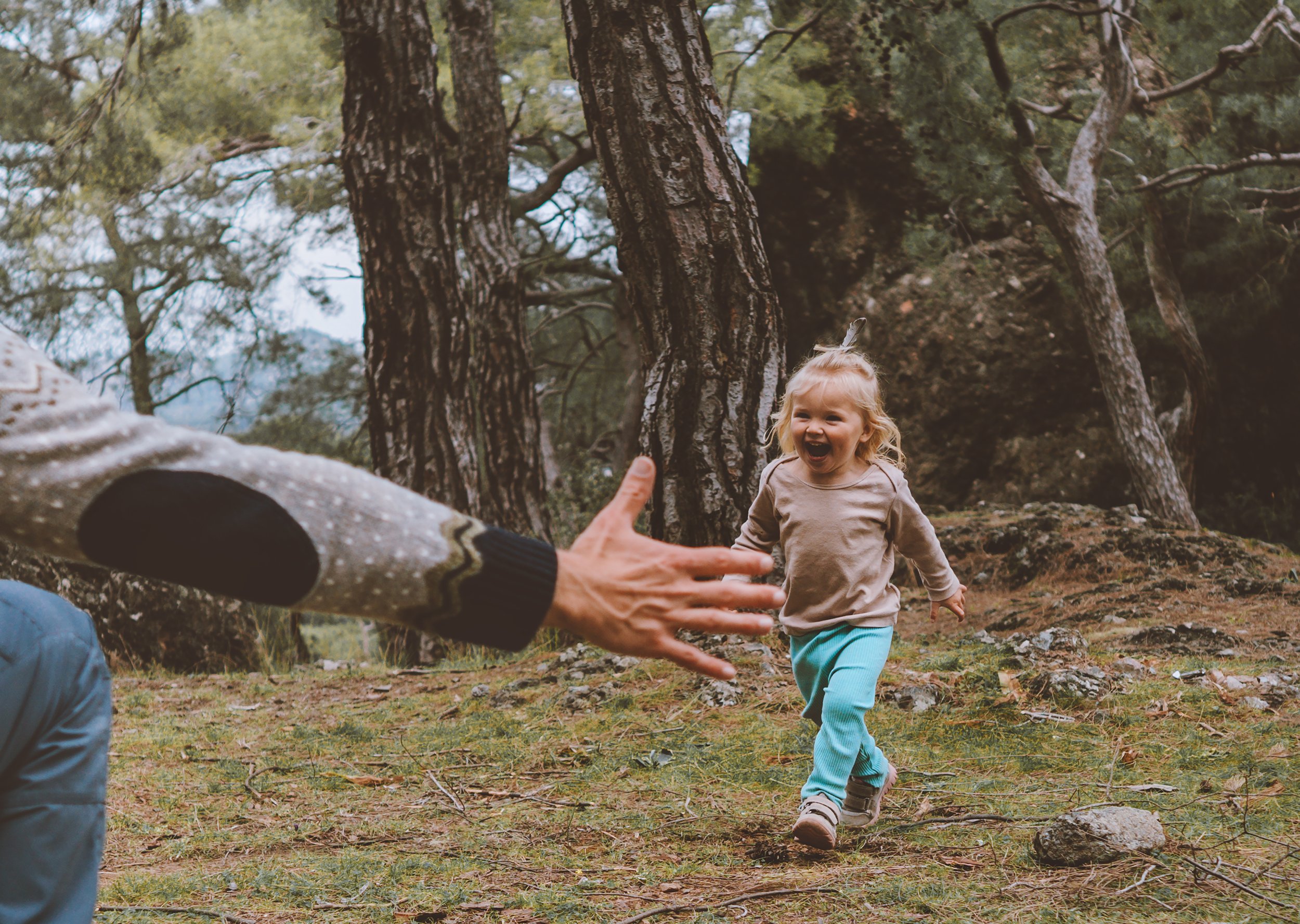Teaching Your Child How To Say Their Name
There’s nothing much sweeter than watching your baby discover their voice and learn to talk.
Once they’ve started talking, one of the questions lots of parents start asking is when their baby might say their name for the first time.
The answer to this question isn’t as straightforward as we might like.
Because we all have different names, when your baby will be able to say their name will be a little different.
But in general, babies will start trying to say their name (or a nickname) between 18-24 months. And most toddlers will say their full name at your request by the time they turn 3 years old (36 months).
The rest of this post is designed to help you understand better when your baby might say THEIR name.
We’ll walk you through the steps babies go through before they can say their name; and talk about what makes some names harder to say than others.
Plus, I’m excited to share some ways that you can help your baby say their name (when they’re ready of course!).
Learning Their Name - The Process
Your baby’s name isn’t going to be their first word, and it probably won’t be in the first 50 words they say. There are a lot of steps your child will take in their speech development before they are actually able to say their name.
Babies begin the process of learning to say their name by cooing and babbling. Cooing and babbling help babies learn to say different sounds they will use to say words later on. During this period in development, they are learning (primarily) vowels and consonant sounds made with the lips, including the M P and B sounds.
Another important step they take is recognizing their name. Babies generally know their name by 9 months old - much younger than they are able to say their name. This pattern of ‘understanding before saying’ is persistent throughout toddler language development, and while this post focuses primarily on talking, it’s important to know that understanding always comes before babies using or saying words.
Related: For tips on how to help your baby know (understand) their name - read here.
The next step towards saying their name, is saying their first words. You’ll notice that these words often use the sounds that babies have practiced when they were babbling - Mama, Papa, and Bye-Bye are often amongst the first words babies say.
Around the same time or before babies say their first word, you’ll also notice that they begin to “speak in their own language.” In the world of speech and language development, we refer to this as jargon. Jargon is important as your baby works towards saying their name because they get practice making new sounds and combining sounds in new ways, which will be very important, especially if their name is longer.
After the first words, your child’s vocabulary will continue to grow and their pronunciation will improve. After your child has some practice with talking, they will begin trying to say their name (18-24 months). By 3 years old children are able to pronounce most (not all) sounds and other people will be able to understand them when they say their name, even if it doesn’t sound perfect.
So, when to expect your child to say THEIR name?
In thinking about when your child will say THEIR NAME, consider these general guidelines.
Things That Make Names Harder To Pronounce
In general, longer names are harder to pronounce than shorter names. For example, Amy is easier to pronounce than Annastasia.
In general, names that have 2 consonant sounds next to each other are harder to pronounce than names that don’t. For example, Stephanie and Troy are harder to pronounce than Sam or Tom.
Names that have these sounds are usually harder for toddlers to pronounce because these sounds are mastered later (think preschool years) when the speech system is more advanced - L, R, Th, S, Z, Ch, J
Here are even more examples:
Some easier to pronounce names: Amy, Nate, Matt, Bodhi, Mia, Maya, Kai, Ada, Noah, Adam, Tom, Bobby, Annie
Some harder to pronounce names: Stephanie, Nicholas, Zachary, Theodore, Sandra, Lindsay, Troy, Faith, Molly, Raven, Sarah
If you’ve found your child’s name on the harder to pronounce list, there’s no need to worry. You haven’t picked a bad name! (My name is on the hard to pronounce list!). And, it doesn’t mean that your baby won’t say their name, it just means it might take them a little bit longer to pronounce their full name correctly.
For children with harder to pronounce names, they might reach the “say their name” milestone on the later end of the age range (Try to say their name by 24 months rather than closer to 18 months; Say their full name closer to 3 years than 2 years), and that’s totally fine!
How to Help Your Child Say Their Name - 3 Ideas for at home
There are always some exceptions to words your toddler can pronounce. They may learn to pronounce a word (or their name) with later developing sounds because it’s an exciting word. Which means your little one may say their name sooner than you expect, even if it’s on the hard list.
Saying their name is a skill you can’t rush, but you can use these ideas at home to encourage your child along in the process of learning to say their name.
Say their name
The first thing to do when teaching your child to say their name is to repeat it… A LOT.
There are many different ways to incorporate repeated use of their name. Here are some ideas:
Say their name to get their attention before you ask a question- “Stephanie, Do you want the blue car or yellow car?”
Watch videos or look at pictures together and talk about who it is. Kids love watching videos of themselves and this can be a great way to get a lot of practice naming them and all the other people in the video.
Actually ask them “What’s your name?” and make it playful. Answer and say their name slowly so their can see how you are moving your mouth to pronounce it.
And if you want to help your child get to saying their “real” name (rather than a nickname), it’s important to call them by their “real” name most of the time. In general, toddlers will learn to say the name you and other family members usually call them.
2. Work on the sounds first
If your child’s name has some harder to pronounce sounds, it might be helpful to practice with those challenging sounds in shorter words first.
We’ve put together a fantastic exercise that walks you through step by step how you can identify the sounds your child can pronounce, the ones they haven’t mastered just yet, at what age to listen for those hard sounds, and in what order to teach new sounds at home.
This suggestion is all about building the foundation in your little one’s speech development to give them the tools they need to be able to pronounce their name!
3. Consider a nickname
That being said, there’s absolutely nothing wrong with using a nickname.
For example, most people (kids and adults alike) call me Steph. It’s easier to pronounce and faster to say than the full Stephanie.
If your child’s name is long or has several characteristics of a harder to pronounce name, you might consider using a nickname to help facilitate easier pronunciation. There’s no right or wrong!
If you opt for a nickname, you can help them learn to pronounce their full name after they learn their nickname. And if you’ve shortened their name (i.e. Steph instead of Stephanie), learning the whole thing will be easier because you’re just adding on!
Should I be worried if my child can’t say their name?
Worrying! We all do it 😩
And I am sure you want to know if or when you need to be worried about your child not saying their name.
Children usually start trying to say their name between 18-24 months old. And they are able to tell someone their full name (or getting pretty close if their name is more complicated) by 3 years old.
If your toddler is 2 years old and they aren’t trying to say their name (it doesn’t have to sound perfect) or they are 3 years old and other people can’t understand their name when they say it, I would recommend talking to your pediatrician about the possibility of a speech and language evaluation.
Although saying their name is so exciting and important, it’s also important to remember that it’s only one word. However, I know it’s a super important and meaningful word that you probably want your child to learn sooner rather than later. You and your child’s pediatrician can help you take a closer look at your child’s overall speech and language development to determine if support via speech therapy may be appropriate.
Here are a few more questions parents often ask about names:
-
If you ask your child, “What’s your name?” listen for them to respond with their full name by the time they turn 3 years old.
-
The first step is to be sure your child understands their name. You can help your child know their name by using it often and lovingly when playing and interacting with them.
Once your child knows their name, it’s time to practice saying their name. Play the “What’s your name?” game by asking and answering the question for your child. Be sure your child can see your face so they can copy your mouth movements and try to say their name too! It can also be helpful to say their name slowly (e.g., Ssssstephanieeeee) so it’s easier for them to see how your mouth is moving.
And if your child’s name is hard to pronounce, consider teaching them to say a nickname first.
-
Calling their name is a common way you get your baby’s attention. If they aren’t responding when you say their name and your baby is 9 months or older, it’s a good idea to talk to your child’s pediatrician about your concerns.
A hearing evaluation will likely be recommended to be sure your child can hear all the sounds you’re saying, as well as other developmental evaluations to help you find all the best resources to support your little one.
-
There are several reasons why a 2 year old may not say their name.
Before children can say their name, they need to understand or know it. Sometimes it’s harder for children to say their name if they are often called by a nickname; children will usually say their name that people call them by most of the time first.
Another reason that a 2 year old may not be saying their name is that they haven’t had enough practice! Saying your name is a skill that has to be learned, and it usually doesn’t evolve overnight.
Your child’s name may be hard to pronounce and they haven’t learned to say all the sounds in their name yet.
Or your child may be facing one or more challenges in their speech and language development, and a speech therapist may be able to support them in learning the skills that help them build up to saying their name.
Written By: Stephanie Keffer, MS, CCC-SLP
References:
American Speech-Language-Hearing Association. (n.d.). Birth to one year. American Speech-Language-Hearing Association. Retrieved October 12, 2022, from https://www.asha.org/public/speech/development/01/
Roseberry-McKibbin C. Hegde M. N. & Tellis G. M. (2019). An advanced review of speech-language pathology : preparation for the praxis slp and comprehensive examination (Fifth). PRO-ED.
© 2020-2025. Stephanie Keffer Hatleli, MS CCC-SLP. All Rights Reserved.
The content offered on ToddlerTalk.com is for informational purposes only. Toddler Talk is not engaged in rendering professional advice, whether medical or otherwise, to individual users or their children or families. No content on this site, regardless of date, should ever be used as a substitute for direct medical advice from your doctor, speech language pathologist, or other health professional. By accessing the content on ToddlerTalk.com, you acknowledge and agree that you are accepting the responsibility for your child’s health and well-being. In return for providing you with information related to home speech and language practice, you waive any claims that you or your child may have as a result of utilizing the content on ToddlerTalk.com.






